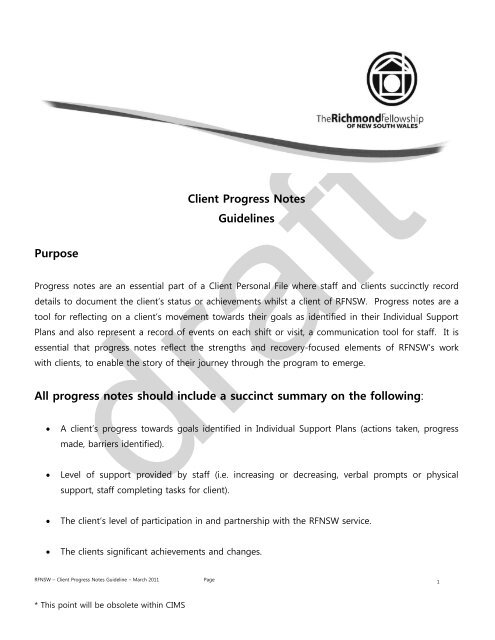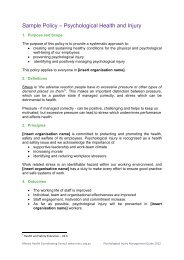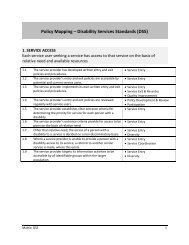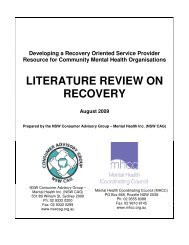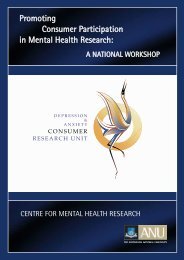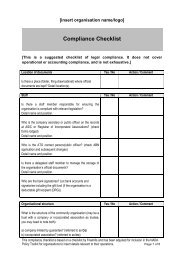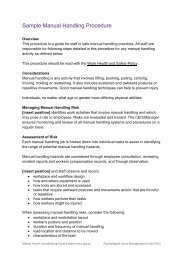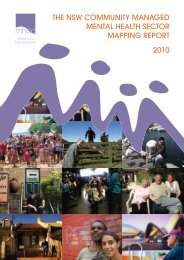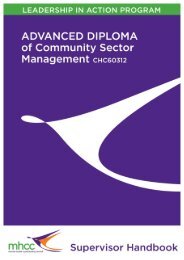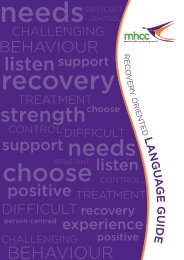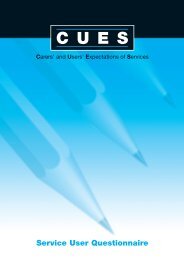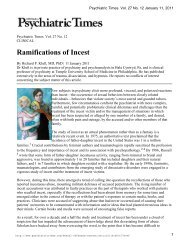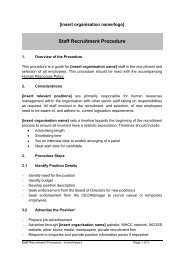SAMPLE Progress Notes Guidelines - The MHCC Policy Resource
SAMPLE Progress Notes Guidelines - The MHCC Policy Resource
SAMPLE Progress Notes Guidelines - The MHCC Policy Resource
Create successful ePaper yourself
Turn your PDF publications into a flip-book with our unique Google optimized e-Paper software.
Client <strong>Progress</strong> <strong>Notes</strong><br />
<strong>Guidelines</strong><br />
Purpose<br />
<strong>Progress</strong> notes are an essential part of a Client Personal File where staff and clients succinctly record<br />
details to document the client’s status or achievements whilst a client of RFNSW. <strong>Progress</strong> notes are a<br />
tool for reflecting on a client’s movement towards their goals as identified in their Individual Support<br />
Plans and also represent a record of events on each shift or visit, a communication tool for staff. It is<br />
essential that progress notes reflect the strengths and recovery-focused elements of RFNSW’s work<br />
with clients, to enable the story of their journey through the program to emerge.<br />
All progress notes should include a succinct summary on the following:<br />
<br />
A client’s progress towards goals identified in Individual Support Plans (actions taken, progress<br />
made, barriers identified).<br />
<br />
Level of support provided by staff (i.e. increasing or decreasing, verbal prompts or physical<br />
support, staff completing tasks for client).<br />
<br />
<strong>The</strong> client’s level of participation in and partnership with the RFNSW service.<br />
<br />
<strong>The</strong> clients significant achievements and changes.<br />
RFNSW – Client <strong>Progress</strong> <strong>Notes</strong> Guideline – March 2011<br />
Page<br />
1<br />
* This point will be obsolete within CIMS
Appointments attended<br />
<br />
<strong>The</strong> outcome of Service Coordination Meetings.<br />
<br />
All communication with other services involved with client (including phone calls, emails, faxes,<br />
face-to-face contact). All attempts to contact other services need to be recorded.<br />
<br />
Referrals made.<br />
<br />
Group activity participation (provided by the RFNSW service and externally).<br />
<br />
Any information given to clients<br />
<br />
Any follow-up required.<br />
<br />
All informed consent decisions (e.g. Client provided consent for staff to discuss low mood with<br />
mental health case manager).<br />
Important Points Regarding <strong>Progress</strong> <strong>Notes</strong><br />
<br />
Personal client file notes including progress notes are legal documents. <strong>Progress</strong> notes can also<br />
be subpoenaed at any time and staff can be cross-examined in a court regarding the contents<br />
of progress notes.<br />
<br />
Remember all client data in the personal client file including progress notes is to be kept<br />
confidential.<br />
<br />
All client personal files must be kept in a secure location and accessed only by authorised<br />
RFNSW staff.<br />
<br />
Ensure all sections of the file, are kept in a clean and tidy condition in the approved RFNSW<br />
order. <strong>Progress</strong> notes must be kept in a chronological order.*<br />
RFNSW – Client <strong>Progress</strong> <strong>Notes</strong> Guideline – March 2011<br />
Page<br />
2<br />
* This point will be obsolete within CIMS
An entry into the progress notes must be recorded during every contact or each shift (morning,<br />
evening and night) depending on the program.<br />
o For residential services: following night shift, where there has been no contact, a progress<br />
note must be made stating “Nothing to Report on Night Shift”.<br />
<br />
All progress notes should be read at the start of each shift, in order that support workers have a<br />
clear indication of the client’s current situation, what support the client will require, or what<br />
follow-up activities need to occur during the shift.<br />
All progress notes should be written with reference to the previous entry. For example if<br />
morning shift notes refer to client’s low mood, the subsequent notes on evening shift must<br />
comment on mood (i.e. improvements, ongoing concerns, management of concerns).<br />
<br />
<strong>Progress</strong> notes must reflect the client’s communication, behaviour accurately and fairly.<br />
<br />
When writing progress notes workers must be mindful of how someone reading the notes will<br />
perceive the entries regarding the client and the RFNSW service provision.<br />
<br />
Client’s have the right to request to read their own file notes.<br />
Do’s and Don’ts of Writing <strong>Progress</strong> <strong>Notes</strong><br />
Do<br />
Write the Client’s full name on each page.*<br />
RFNSW – Client <strong>Progress</strong> <strong>Notes</strong> Guideline – March 2011<br />
Page<br />
3<br />
* This point will be obsolete within CIMS
Record date and time of every new entry in the date column. Time should be in 24 hour time<br />
(i.e. 2300 for 11pm).*<br />
Make entries as close to the time of client contact as possible. (Contemporaneous)<br />
Identify late entries as such. Record the date and time that the late entry is being made in the<br />
date column, and the date of the contact in the notes section (i.e. written in retrospect for<br />
13/02/2011).<br />
Continue notes by clearly stating on the new page: i.e. 13/02/2011 (cont) in the date column on<br />
the following page.*<br />
Write entries in black biro pen (not felt tip pens).*<br />
Write legibly. Print if your handwriting is not legible.*<br />
Ensure that the spelling, grammar and punctuation is correct.*<br />
<br />
Use approved abbreviations only.<br />
Write concisely. Stick to essential information. <strong>Notes</strong> can be written using headings and dot<br />
points to assist with brevity.<br />
Record the names of people involved in conversations, activities or incidents.<br />
Use Action plans to enhance communication and reduce the risk of follow-up being lost in<br />
verbal handover. Examples of sub-headings that can be used include:<br />
o<br />
o<br />
o<br />
o<br />
Action Plan: for any tasks to be followed up on as numbered items<br />
eg. Phone Call to be made to...<br />
Discussion regarding… to take place...<br />
Support to appointment...”.<br />
RFNSW – Client <strong>Progress</strong> <strong>Notes</strong> Guideline – March 2011<br />
Page<br />
4<br />
* This point will be obsolete within CIMS
o<br />
o<br />
o<br />
o<br />
o<br />
o<br />
Outcome:<br />
Phone call to … talked about…<br />
2.Discussion had re: the following:<br />
a). Jane’s achievements through the week...<br />
b). Jane’s ongoing low mood...<br />
3) Observations of...”.<br />
Make reference to related notes written in previously. For example, (see entry on 3/2/11) you<br />
may comment on the client’s mood (observations/discussion re: mood, support provided, how<br />
client managed).<br />
Use descriptions: objective (when staff report on things that they observe) or subjective (when<br />
staff report on what the client says or feels). Observations are reasonably undisputable facts of<br />
action, appearance or statement.<br />
Write your observations as you saw them in a factual manner (e.g. “Jane was observed to be<br />
crying, head in hands)”.<br />
Be descriptive in your notes, describe what was actually said, tone used, body language etc, i.e.<br />
“Mary was shouting loudly in a high pitched angry way, swearing and saying I was useless.<br />
Throughout her shouting she was staring wide eyed and pointing at me ”.<br />
Be mindful of language used. Comment in a respectful and non-judgemental manner, using<br />
strengths and recovery-focused language.<br />
Sign the progress note after each entry, <strong>The</strong> worker making the entry must provide their<br />
signature, designation and printed name [i.e. Samantha Jones (S Jones MHRW).*<br />
Don’t<br />
Alter notes or use correction fluid. Incorrect entries should be corrected by drawing a single<br />
straight line through the mistake and writing ‘error’ and initialling above the error. <strong>The</strong> correct<br />
word or statement should then follow.*<br />
RFNSW – Client <strong>Progress</strong> <strong>Notes</strong> Guideline – March 2011<br />
Page<br />
5<br />
* This point will be obsolete within CIMS
o<br />
I.e. Joan stated that she had taken medication error JF did not take her medication today.<br />
Leave any spaces between entries. Use a line to fill in the blank area.*<br />
Transcribe doses of medication in progress notes (As per RFNSW policy) i.e. do not write the<br />
milligrams next to the medication name, write instead “name of staff observed 1 ½ tablets of<br />
Lithium taken”).<br />
Write a diagnosis if you are not qualified to make a diagnosis. I.e. Jane’s is suffering with<br />
anxiety. Write symptoms instead (e.g. “Jane displays symptoms or signs consistent with anxiety,<br />
wringing hands, sweating, Joan reports loss of appetite, ...”<br />
Use the following words: abnormal, abusive, anxious, impulsive, irrational, overwhelmed,<br />
resistant, suicidal, threatened, troubled, delusional, dangerous, disturbed, hysterical, immature,<br />
uncooperative, lazy, unfit, stubborn etc. UNLESS they are accompanied with a clarification. I.e.<br />
“I observed Jane to be highly anxious, biting nails, pacing around the room, pulling at hair,<br />
saying that she felt like her head would explode re: subjective feelings of anxiety…”.<br />
Use jargon. Ensure you understand and can clarify all language used (i.e. do not use clinical<br />
terminology unless you are confident of the meaning and can explain the meaning).<br />
Make assumptions. Do not use the word ‘appeared’.<br />
Express your opinions or impressions UNLESS you state that it is your opinion.<br />
include information such as “I said then she said” and “I went to their home at 8.30am but noone<br />
was up so I went back to the office and will return to check in at the home in 40 mins”<br />
RFNSW – Client <strong>Progress</strong> <strong>Notes</strong> Guideline – March 2011<br />
Page<br />
6<br />
* This point will be obsolete within CIMS


